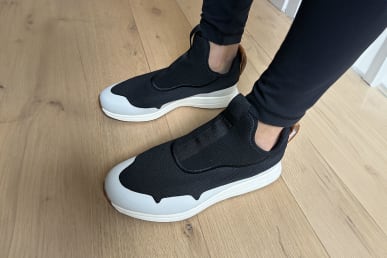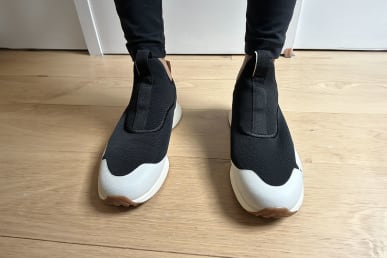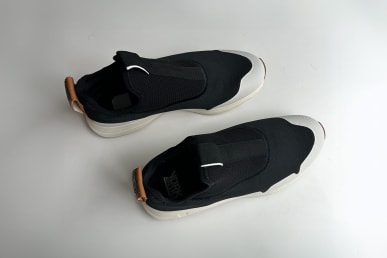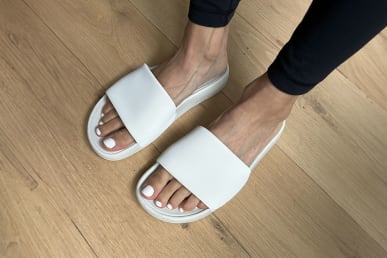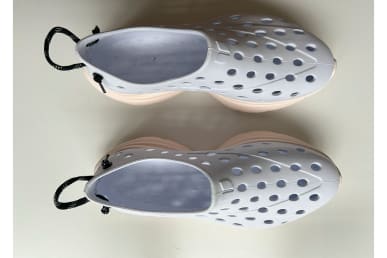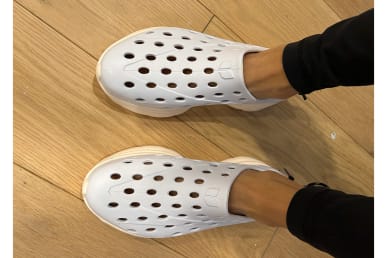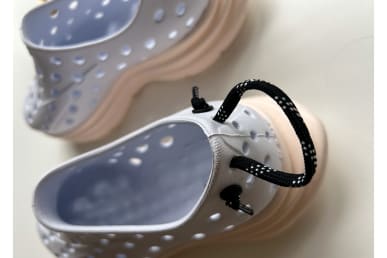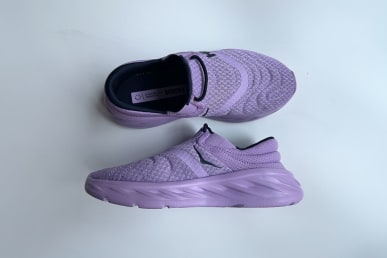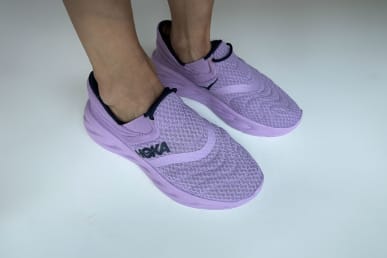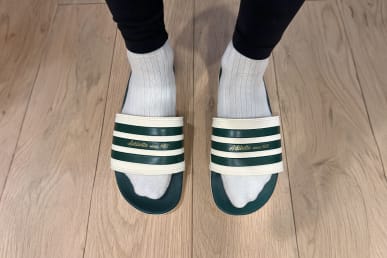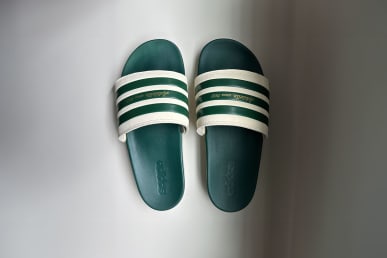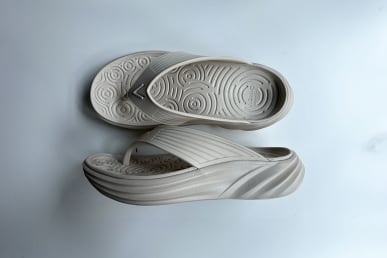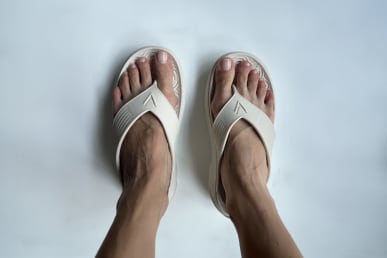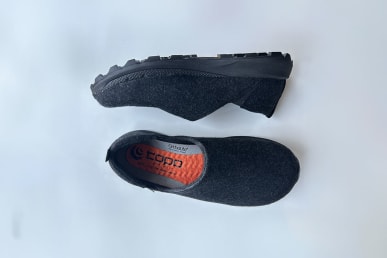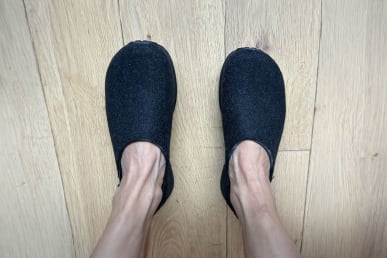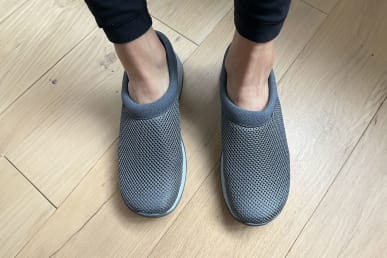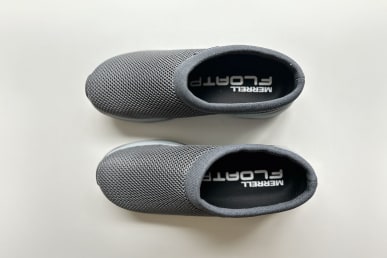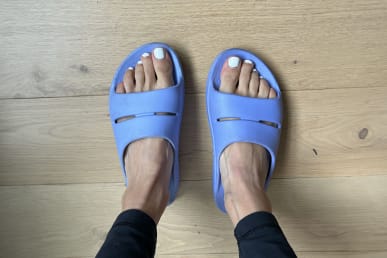Advertisement
9 Best Recovery Shoes To Improve Performance, Per A Marathon Runner

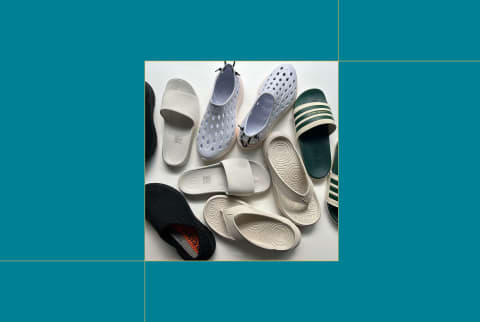
As a marathon runner, I value recovery just as much as heavy training days—but recovery isn't limited to yoga classes or massage guns. Experts say the best recovery shoes can help your body bounce back faster and stronger, and it all comes down to the construction of these plush, cloud-like shoes.
"Recovery shoes offer enhanced cushioning, arch support, and shock absorption," says London-based podiatrist Dina Gohil, DPM. As a result, the footwear can "reduce stress on the feet, joints, and muscles, promoting faster recovery and alleviating discomfort.”
I spent the last few months testing out recovery shoes to find the absolute best options on the market to help my legs feel less tired after long runs and strenuous workouts. Below, find my vetted selection of recovery shoes to keep your body performing at its best.
- Best slip-on sneaker: York Gail Recovery Trainers
- Best slides: Lululemon Restfeel Women's Slide
- Best waterproof: Kane Revive Recovery Shoes
- Best podiatrist-recommended: Hoka Ora Recovery Shoe 2
- Best flip-flop: Vionic Tide RX Recovery Sandal
- Best budget: Adidas Unisex-Adult Adilette Comfort Slide
- Best for winter: Topo Athletic Rekovr 2
- Best for walking: Merrell Encore Breeze 5
- Best for standing all day: OOFOS Ooaah Slide
About the tester:
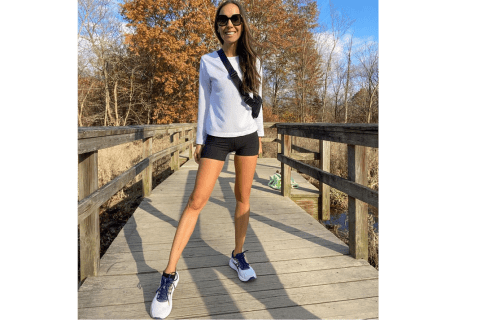
- Age: 35
- Foot type: Narrow, neutral arches
- Foot Issues: Bunions (years of dancing and running!)
- Activity Level: Very active
- Go-To Workout: Running and strength training
Editor's Note
The best recovery shoes of 2024
Pros & cons
Pros & cons
- Easy to slip on and off
- Chic aesthetic
- Great for any surface
- Not sustainable materials
- Some rubbing around the ankles if you don't wear socks
Made with a cloud-like EVA sole, the York Gail Recovery Trainers deliver plush support without compromising on stability. While they look great on the outside, the design hides smart features that optimize your recovery.
There's a stabilizing heel counter to keep your ankles in alignment, while the stretchy knit upper expands to allow your foot to relax. Plus, the lace-free design is great for slipping the shoe on and off after "arm day."
I'm a huge fan of wearing these shoes for long walks or while working at my standing desk. Their slip-resistant gum rubber outsole provides better grip and traction than many other recovery shoes that I've tried.
Want to know more? Read my full review of the York Gail Recovery Trainers.
Pros & cons
Pros & cons
- Extremely comfortable and lightweight
- Solid traction on the bottom
- Easy to clean
- Not designed for long walks
- Not sustainable materials
Before I dove headfirst into testing the best recovery shoes, the slide style was the only design I was familiar with—and Lululemon’s Restfeeel Slides are still far and away my favorite pair.
Designed entirely from foam, these plush shoes are a breath of fresh air after a tough workout. The dual-density cushioning gives your feet extra comfort and support, with heel-to-toe rubber traction providing added grip.
I wouldn't wear these for a long walk given the slide design, but I often slip them on for quick errands in my neighborhood. I'm often surprised by how supported my feet feel with every step.
Pro tip: The white slide is still a safe pick! I've found spot-cleaning with a damp cloth makes them look almost brand new.
Pros & cons
Pros & cons
- Raised nodes on the footbed activate blood flow & enhance recovery
- Lightweight, breathable, waterproof design
- Sustainable materials
- Not for colder weather
- Squeak when worn without socks
Designed to improve circulation and reduce inflammation, Kane’s Revive Active Recovery Shoes provide instant relief for my sore, tired feet. Yes, they look a little funky, but the design truly does deliver on its purpose: enhanced recovery.
The slip-on sneakers have tiny nodes along the footbed, which activate blood flow in key pressure points. Meanwhile, the perforated upper allows ample airflow to cool sweaty feet without sacrificing a secure fit.
As expected, there's also ample cushioning—but Kane opts for a renewable resources (mainly Brazilian sugar cane) to create its signature RestoreFoam.
After trying these recovery shoes for the first time, I ordered a second pair very soon. Let's just say they're an MVP in my rotation.
How can these shoes improve your blood flow? Check out my full Kane Revive Recovery Shoes review to find out.
Pros & cons
Pros & cons
- 100% vegan materials
- Great cushioning but still lightweight
- Soft-yet-sturdy with great arch support
- Too wide for some
- No half sizes
Almost every one of our shoe round ups includes a pick from Hoka—and there's a long list of reasons why podiatrists keep recommending this brand. Per Gohil, the Hoka Ora Recovery Shoe is perfect for post-run recovery, with maximum cushioning and a soft-yet-supportive feel.
When testing this shoe, I was immediately impressed by the lightweight design despite its thick cushioning. At first glance I thought the shoe would be too constricting for warmer weather, but the mesh material is exremely breathable.
These are one of my favorite recovery shoes to wear on active recovery days because the brand designed them to be supportive enough for when you're out and about. A compression molded EVA midsole provides cushioning and stability, while an early state MetaRocker helps your foot glide from heel to toe when you’re on the move.
Pros & cons
Pros & cons
- Very lightweight
- Great for travel, beach days, or the pool
- Budget-friendly
- Not the most supportive or well-cushioned
This simple slide is a great budget option for days when your feet just need a break. You won't find super thick cushioning on the Adidas Adilette Comfort Slide, but the soft foam footbed is still comfortable underfoot.
My favorite feature is the contoured toe bed; it helps lifts your toes to keep them in alignment. Plus, the fast-drying design is great for days by the pool (or for people who simply have sweatier feet).
I personally love tossing these classic slides in my travel bag when I'm going on a trip because they take up minimal space and barely add any weight—yet they're still way comfier than your typical pair of flip flops.
Pros & cons
Pros & cons
- APMA Seal of Approval
- Textured footbed stimulates your nerve endings
- Deep heel cup and tall sidewalls hug and support your feet
- Cushioning takes some time to break in
With nearly three inches of thick cushioning in the heel, these are not your average flip-flops. The Vionic RX Recovery Sandals have a molded EVA footbed with an oversized sidewall and deep heel cup to hug and support your feet in a way standard flip-flops don’t.
The coolest part about these recovery shoes is the texturized footbed which offers massaging relief for your feet with every step. I love the way the shoes vitalize the nerves in my feet, and I truly believe it helps them recover faster.
I don't typically love walking in flip-flops, but I walked 7,000 steps in these the first day I got them. I was surprised by how comfortable and supportive the style felt, however I'll likely reserve them for quicker errands.
My one qualm is that the thick cushioning is not as soft as I expected, but some reviewers say they just need to be broken in. And I love knowing that these shoes received the APMA Seal of Acceptance, confirming that they are beneficial for foot health.
Pros & cons
Pros & cons
- Wool material is great for cooler weather, yet still breathable
- Ortholite technology feels like a subtle massage as you walk
- Supportive enough for longer outdoor walks
- Too hot for warmer weather
During winter training months, these wool recovery shoes were my savior. While many recovery shoes are sandal or breathable material, the Topo Athletic Rekovr 2 is made with a blended wool material that keeps your feet cozy (but not too warm).
Of course, you can count on these recovery shoes to have a spacious toe box, ample cushioning, and great arch support—but my favorite feature is the shoe's 3D Wave Sense Technology.
The textured Ortholite footbed has foam ridges that stimulate the feet when you walk. It makes every step like a subtle massage.
Speaking of walking, I take a lot of long outdoor strolls in the winter wearing this wool mule. Its traction outsole ensures I never have to worry about slips or falls.
Pros & cons
Pros & cons
- Great traction & support for walking or hiking
- Natural anti-odor treatment
- Removable footbed for custom orthotics
- Some people say the outer rim is too wide for their foot
Merrell's breathable recovery shoes are the best option for someone who wants to stay active on their recovery days. The stabilizing design relies on a sturdy nylon shank to support your foot's alignment and a foam footbed for added comfort.
A sticky rubber outsole provides solid traction for the outdoor style, and I even successfully wore them on an easy 3-mile hike without fear or tripping or twisting my ankle.
And while my feet didn't sweat in the mesh design, I knew the vegan shoe's anti-odor treatment would have me covered they did.
A few other important call outs: These sneakers are made with a 100% recycled mesh lining (don't worry, it's still soft!) and have a removable footbed to fit custom orthotics.
Pros & cons
Pros & cons
- Soft, pillow-like feel
- Great impact absorption and arch support
- Podiatrist-recommended and worn by athletes
- Not sustainable materials
OOFOS were my first recovery shoe—and they'll always hold a special place my recovery routine. A leader in the recovery space, the brand's proprietary foam "absorbs 37% more impact than traditional foam materials"—and Dr. Gohil says this particular shoe offers excellent cushioning and support.
I still remember the first time I slipped on the OOahh slides. The soft and pillow material felt like clouds under my feet—and I couldn't help but rock back and forth to bask in the comfort. Even better, I was truly impressed by how much quicker my body recovered when I wore these on rest days.
It's no surprise these slip-on shoes can be spotted on professional athletes and marathon runners alike, and I've had countless experts recommend them. Podiatrist Anne Sharkey, DPM, says OOFOS is her "most-recommended recovery shoe," and adds that they have great arch support.
After a particularly long run or heavy strength training workout, these are my favorite shoes to wear—and I fully believe that the thick, cushiony OOfoam™ does in fact absorb more impact than traditional foams.
Comparing the best recovery shoes
| Product | Cost | Sizes | Colorways | Materials |
|---|---|---|---|---|
| Kane Revive Recovery Shoes | $75 | 5-20 | 16 | RestoreFoam™ made from Brazilian sugarcane |
| Hoka Ora Recovery Shoe 2 | $90 | 7-14 | 4 | Memory foam; EVA foam |
| Adidas Unisex-Adult Adilette Comfort Slide | $28 | 5-19 | 16 | EVA foam |
| York Gail Recovery Trainers | $90 | 4-13; half sizes available | 2 | EVA foam; PU foam; 2-way stretch jersey material |
| Topo Athletic Rekovr 2 | $120 | 6-12; half sizes available | 2 | Antimicrobial blended wool; Vibram® XS Trek EVO foam; Ortholite footbed |
| Merrell Encore Breeze 5 | $105 | 5-12; half sizes available | 6 | 100% recycled mesh; PU foam; FloatPro™ Foam; nylon |
| Lululemon Restfeel Women's Slide | $58 | 5-12 | 8 | Foam |
| Vionic Tide RX Recovery Sandal | $100 | 5-12 | 10 | EVA foam |
| OOFOS Ooaah Slide | $60 | 5-16 | 10 | Proprietary OOfoam™ |
How we tested & selected the best recovery shoes
I’ve been wearing recovery shoes for two years as a part of my active recovery routine while training for multiple marathons. Over this time, I tested 12 recovery shoes from 10 brands and narrowed down our list based on the below criteria.
- Comfort: If a recovery shoe doesn’t offer an immediate sense of relief when it’s slipped on, don't waste your money. We only included shoes with enough cloud-like cushioning to feel comfortable for a wide variety of foot types (without sacrificing support).
- Price and quality: The best recovery shoes are worth the investment, but we also know how much running shoes cost as it is. We found options to meet a range of budgets, evaluating each shoe to make sure the quality matched the price.
- Materials: At mindbodygreen, we value sustainability and the health of our planet—so we prioritized shoes that use eco-friendly materials whenever possible.
- Testing: I wore each of these shoes multiple times for at least two hours per wear, with a fair amount of walking. I’ve included my own feedback for every option, along with perspective from others who have tested them.
- Podiatrist insights: We interviewed board-certified podiatrists to get a well-rounded expert take on what makes a good recovery shoe. We’ve also included specific shoe recommendations from podiatrists.
Who should wear recovery shoes?
Gohil and Sharkey agree that recovery shoes are not just for runners or athletes. Per Sharkey, "Recovery shoes are commonly used by athletes—but everyone can benefit from the use of a recovery shoe."
Here's who might want to consider using a recovery shoe, according to our experts:
- Athletes and runners who want to speed up recovery after intense workouts or competitions
- People who spend long hours on their feet
- Those with foot conditions such as plantar fasciitis, arthritis, or general foot pain who require additional cushioning and support
- People who suffer from low back pain
FAQ:
What is a recovery shoe?
"A recovery shoe is designed to aid in the healing and rejuvenation process after physical activity," Gohil explains. "These shoes offer enhanced cushioning, arch support, and shock absorption to reduce stress on the feet, joints, and muscles, promoting faster recovery and alleviating discomfort."
Do recovery shoes really work?
“Recovery shoes can be highly effective,” Gohil says. “They are specifically engineered to support the foot's natural biomechanics, reduce impact stress, and enhance comfort.”
Gohil adds that many of her clients who wear recovery shoes decreased pain, improved comfort, and quicker recovery times when using recovery shoes after workouts or long periods of standing.
Can you wear recovery shoes all day?
Gohil says in most cases recovery shoes can be worn all day—but it's essential to ensure they provide the necessary support and fit for prolonged wear. “Some recovery shoes may lack the structure needed for all-day use, so it's advisable to alternate with other supportive footwear if necessary,” she adds.
Podiatrist Anne Sharkey, DPM, agrees adding that for walking, exercise, and activity, her recommendation is to wear “activity appropriate shoes.”
The takeaway
When I first started running, I thought the only shoes that mattered were the sneakers I laced up for my training runs—but after bouts of shin splints, knee pain, and muscle fatigue, I learned firsthand how impactful the best recovery shoes can be.
Since I started integrating recovery shoes into my routine my joint pain is gone and my feet and legs feel way less fatigued.
Training for a race? Check out our guide to the best long distance running shoes.
